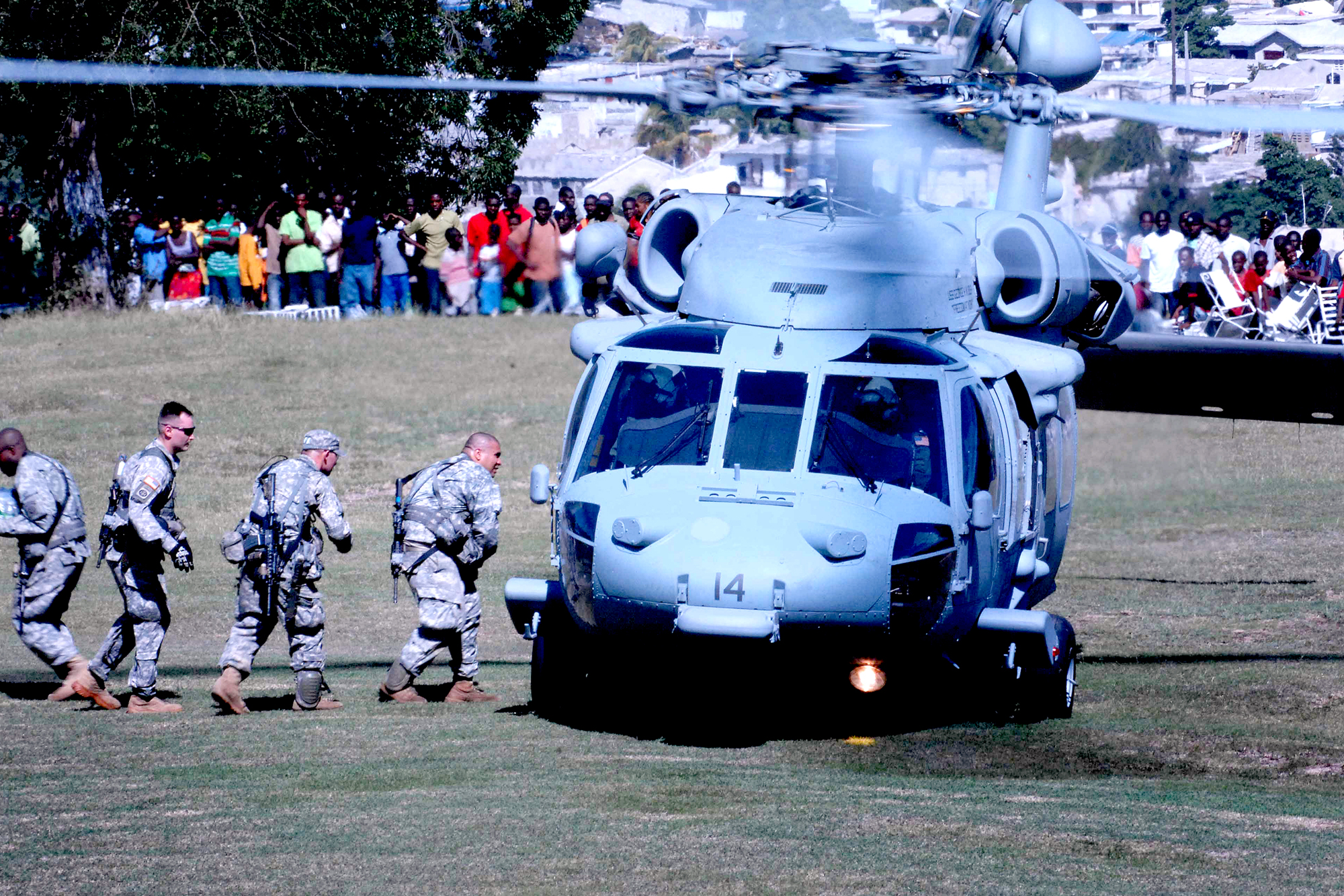
PORT-AU-PRINCE, Haiti (BP)–Conditions on the ground in Haiti are very difficult, a member of Southern Baptists’ joint assessment team reported from Port-au-Prince Jan. 20. A U.S. military commander, however, said important progress has been made on enlarging the conduit for relief shipments into the quake-ravaged island nation.
“We’ve seen quite a bit of damage — more so toward the center of the city,” reported Jim Brown, U. S. director for Baptist Global Response, in a terse e-mail sent from his cell phone. “We’ve helped with a couple of deliveries. Helicopters everywhere. People still being found alive!”
In another report, relayed to a meeting of the Southern Baptist Disaster Relief Network, team member Bruce Poss indicated that traffic in Port-au-Prince is terrible, with milling crowds making for serious travel and security concerns. He reported seeing 5,000 or more people lined up outside the U.S. Embassy in the capital.
The five-member team delivered relief supplies — water, plastic sheeting, bottled gas, beans, rice, eggs, diesel fuel, canned goods — to a couple of churches and orphanages, Brown said. They were planning to connect with a Florida Baptist assessment team later in the day.
A U.S. military commander said the flow of relief supplies into Haiti would be helped by the opening of three new airfields and the country’s seaport, news services reported. Gen. Douglas Fraser, who heads the U.S. Southern Command, told the Miami Herald the capital’s seaport would reopen Jan. 21 and could accommodate about 150 shipping containers per day. The port’s capacity is expected to grow to 250 containers per day by Jan. 22.
The main airport in Port-au-Prince, which has one runway and one loading ramp, has been a bottleneck for the arrival of humanitarian aid, even after it was reopened. A total of 1,400 flights are backlogged to land at the airfield, Fraser said. Because congestion on the roads has been hindering delivery of relief supplies, 63 U.S. helicopters have been dropping water, food and medical supplies into the most inaccessible areas, he told the newspaper.
The U.S. military has distributed 1.4 million bottles of water, more than 700,000 meals and about 22,000 pounds of medical supplies directly to people in need, Fraser said.
As many as 2 million Haitians are homeless after the Jan. 12 earthquake, relief officials say, with vast numbers of people living in makeshift tents made of sheets and sticks. The estimated death toll stands at 200,000, but humanitarian medical groups warn that number will continue to grow as people die of untreated injuries and disease that infects the ramshackle camps, news services report.
An International Mission Board team is receiving information from Southern Baptist medical personnel who are willing to help. Interested parties can e-mail [email protected] to register their availability. Baptist state convention disaster relief offices also will be organizing teams of volunteers to help once the assessment teams have returned with strategic recommendations for the response.
The Southern Baptist relief effort, like the one mounted after Hurricane Katrina and the South Asia tsunami, will be focused on the long term, Mickey Caison, who directs disaster operations for the North American Mission Board, told the Southern Baptist Disaster Relief Network Jan. 20. Previous strategies have focused on short-term help for people being missed by large-scale humanitarian projects and a long-term emphasis on helping people rebuild their lives and communities.
The International Mission Board’s prayer office released a Jan. 21 alert urging intercession for Southern Baptist relief workers already on the ground in Haiti, as well as the people of Haiti themselves.
“Pray … for the IMB missionaries who have been in Haiti ministering in very difficult circumstances. Ask God to strengthen them and help them to deal with the extremely sad situations they are witnessing,” the alert said. “Pray for the five IMB missionaries who had served in Haiti for many years and the grief they are experiencing from losing close friends. Continue to pray for the Haitian people as they come to grips with lost loved ones and a difficult future.”
–30–
Mark Kelly is an assistant editor for Baptist Press. Baptist Global Response is located on the Internet aat www.gobgr.org.
Southern Baptists can contribute to “Haiti Earthquake Disaster Relief” through their local church or directly to their state convention, the North American Mission Board (www.namb.net) or the International Mission Board (www.imb.org):
— Initial funding for the relief effort will come from the International Mission Board’s disaster relief fund. Contributions can be made online, www.imb.org, or by mail, International Mission Board, P.O. Box 6767, Richmond, VA 23230.
— The North American Mission Board has set up a Haiti disaster relief fund that will direct money to state conventions and other Southern Baptists who are doing relief work in Haiti. Donations may be made online, www.NAMB.net, by phone, 1-866-407-6262 1-866-407-6262 , or by mail, North American Mission Board, P.O. Box 116543, Atlanta, GA 30368-6543. Make checks payable to “Haiti Disaster Relief Fund/NAMB.”
Regardless of the SBC channel, all funds received for this purpose will go to relief efforts; none will be used for administrative costs.















